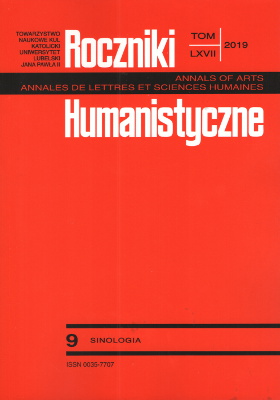Odrodzenie religii w Chinach po Mao
The Revival of Religion in China after Mao
Author(s): Krzysztof KosiorSubject(s): Theology and Religion, History of Religion
Published by: Towarzystwo Naukowe KUL & Katolicki Uniwersytet Lubelski Jana Pawła II
Keywords: religion; China; Mao; Confucianism; Chinese Buddhism; Taoism; Christianity; Communist Party of China; the fight against “superstitions”
Summary/Abstract: The exposure of the agnostic character of Confucianism by Western sinologists has contributed to the unilateral perception of the Chinese religion as dominated by magical activity. The incompatibility of Chinese beliefs with theistic religions, which put God’s presence or the personality of the deity in the foreground, caused the conviction of sinologists has been duplicated by Western researchers of religions. As a result of such an attitude, the residents of the Middle Kingdom were treated as superstitious or even non-religious.Republican politicians, and after them the ideologues of the Maoist CPC, who fought against the “religious superstition,” took it similarly. The persistence of “superstition” was supposed to stabilize social divisions, inhibit development and prevent the effective communication of the party with the people. However, forced atheism, contrary to the expectations of the Maoist communists, did not become a catalyst for uniting the nation or a tool for progress, but it sterilized people spiritually and as a result, instead of coexist peacefully, they sought for their own survival, also at the expense of others.Mao died and was replaced by a pragmatic Deng. He and his successors adopted the view that the possible usefulness of religion suspends any prejudice against it. Moreover, where religion turns out to be useful in building the power of the country, it should be promoted and supported. However, this does not entail a declaration of full religious freedom. Besides, not all religions present in China are treated with equal favour. For various reasons, Chinese Buddhism is distinguished (Hàn chuán fójiào 汉传佛教). The activity of religious institutions is rationed and, in relation to various religions, accepted to a different degree.The paper contains an analysis of the indicated and other aspects of the presence of religion in present-day China.
Journal: Roczniki Humanistyczne
- Issue Year: 67/2019
- Issue No: 9
- Page Range: 71-88
- Page Count: 18
- Language: Polish

